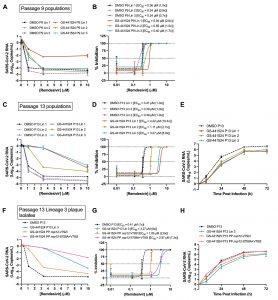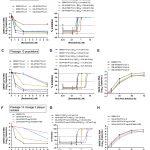A recent study has demonstrated partial resistance of SARS-CoV-2 to the antiviral drug, remdesivir, in vitro.
The study by Stevens, et al., has highlighted the need to understand the mechanisms of resistance, monitor mutations and develop new combination therapies when dealing with COVID-19. Remdesivir has been used in some cases to treat COVID-19 and prevent severe disease, however, although few, there have been cases of remdesivir resistance clinical reported. Remdesivir was the first drug treatment for COVID-19 which is used to treat both hospitalised and non-admitted patients. The antiviral works by means of inhibiting replication of the SARS-CoV-2 viral RNA (READ MORE).
In this present study, the researchers demonstrated that through repeated and prolonged treatment of SARS-CoV-2 following several passages in vitro with remdesivir, SARS-CoV-2 was able to mutate and develop a means of replicating its genome, thereby bypassing the effects of remdesivir (Figure 1).

Figure 1: SARS-CoV-2 RDV resistance develops after serial passaging. SARS-CoV-2 was serially passaged in the presence and absence of GS-441524 in Vero-E6 cells in triplicate lineages. (A) Sensitivity of P9 lineages (Lin) to RDV in A549-hACE2 cells was determined by change in genome copy number. (B) Percent inhibition was calculated from genome copy number (A) and fold-change in EC50 compared to vehicle (DMSO)-passaged lineage 1 at P9. (C) Sensitivity of P13 lineages to RDV in A549-hACE2 cells was determined by change in genome copy number. (D) Percent inhibition calculated from genome copy number (C) and fold-change in EC50 compared to vehicle-passaged lineage 1 at P13. (E) Replication kinetics of P13 drug-passaged viral lineages are shown compared to vehicle-passaged lineage 1. (F) Sensitivity to RDV is shown for plaque-pick (PP) isolates from GS-441524-passaged lineage 3 and vehicle-passaged lineage 1 population viruses and input virus in A549-hACE2 cells, as determined by change in genome copy number. Plaque-picks (PP) from lineage 3 were isolated and expanded in presence of 1μM GS-441524. (G) Percent inhibition was calculated from raw genome copy number (F) and fold-change in EC50 compared to vehicle DMSO-passaged lineage 1. (H) Replication kinetics of plaque isolates tested in (F) and (G). Error bars indicate standard deviation (Stevens, et al. 2022).
More studies would need to be conducted to fully elucidate all the mechanisms of resistance and to further develop new treatments in order to treat SARS-CoV-2 infection (READ MORE).
Journal article: Stevens, L.J., et al., 2022. Mutations in the SARS-CoV-2 RNA dependent RNA polymerase confer resistance to remdesivir by distinct mechanisms. Science Translational Medicine.
Summary by Stefan Botha
